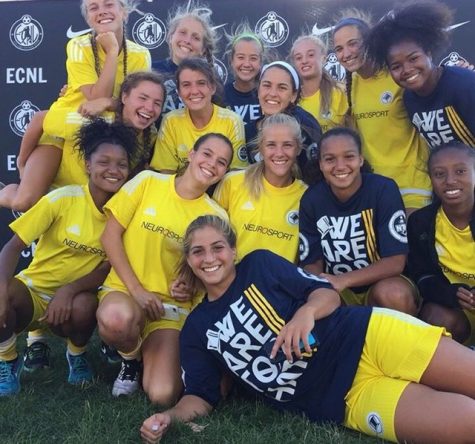The ongoing debate of club vs. school soccer
Club soccer has been growing in popularity among Westminster soccer players, becoming more time consuming and intense. Soccer players’ seasons extend well beyond the spring. After the school year, club soccer kicks into full swing, with an intensity that is hard to match. Players travel all over the country competing in tournaments and exhibitions, often under the watchful eyes of college scouts. “Club is definitely for preparing us to play in college,” said senior Delaney Graham. “It’s just a very competitive environment.” Several players on both the boys and girls teams have verbally committed to play at a high level in college, and the number only is expected to grow when the spring season rolls around.
The competitive environment of club soccer plays a large part in its appeal to younger players. “I like the competition. I get to play against better people from all over,” said junior Daniel DeSouza. The best club teams face off against similarly experienced teams from all over the country, giving the players an opportunity to make connections and meet new people.
Tournaments that involve travel are a favorite among the players. Most club teams only travel within the southeast, but others such as sophomore Astrid Wheeler regularly travel out of the country for tournaments. She has been as far as China playing for the U19 US women’s team. “I like that you get to travel with your club team,” said Wheeler. “It’s fun to play outside of the country.”
The atmosphere surrounding high school soccer is less intense “School soccer is more relaxed,” said DeSouza. “Games are more fun.” Although it is more laid back, many players relish the chance to represent Westminster in the state playoffs.
Coaching strategies and attitudes are also very different. “Club coaches and practices are way harder and more intense,” said DeSouza. “They are harder, but that the intensity is what makes you better and a stronger player.” Coaches for school are usually teachers and have other commitments, while club coaches focus solely on improving their team and training players.
Team atmosphere also plays a big role in the preferences of players. School soccer teams are united under the same colors, but the players often spend years on the same club team, and develop long lasting friendships and team chemistry that make them better as players. “Our club team is definitely closer than the high school team,” said Graham. “We’ve been together for a long time, and we all talk about the same stuff.” Whereas high school players move on and graduate, the continuous roster of club teams bring the player closer together.
Not all players prefer club soccer over school. “High school soccer is just a lot more fun. You go out and play without worrying what college coaches are thinking. It’s a lot more relaxed,” said Graham. “I’ve been able to go out and play the game that I love.” Playing on the school team is a nice break from the intense schedule of club practices and games that take up a few hours each day.
School soccer is regarded as being more “spirit filled” according to senior Erik Montag, who does not play club soccer. “You spend a lot of time with the team and have all your friends watching, so you probably care a bit more about the outcome.” School soccer is perceived as more of a team effort, while club can be more individually focused on results and college recruitment.
There are mixed feelings about both club and school soccer. Some players like the competitiveness of club soccer, but also the team building and friendships involved with both club and school. The atmosphere surrounding both are unique, and personal preference is the only way to distinguish between them. Both make positive impacts on student’s lives, and help prepare athletes for competition at the college and pro levels.








